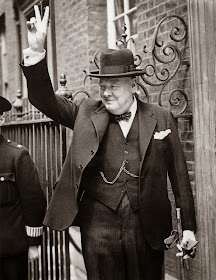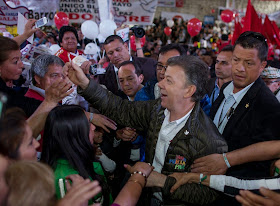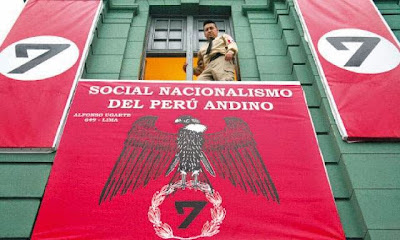An old friend used to say that, because he has neither an interest in nor knowledge of Irish rugby, it follows that he shouldn't have any say in who the national coach is.
He used this as an analogy with the universal franchise; that is, giving everybody over a certain age the vote.
 |
| So is there a better way? (Image from novelandmundane.blogspot.com.) |
He used this as an analogy with the universal franchise; that is, giving everybody over a certain age the vote.
The point he was making is that there are many people out there who display no interest in or have no real knowledge of politics, hence why should they automatically be allowed to participate in it? If you don't care and couldn't be bothered to inform yourself, then you shouldn't be given a vote.
However, comparing a national sports team with politics isn't exactly like for like.
However, comparing a national sports team with politics isn't exactly like for like.
Those charged with running a country or district or the like will, for better or for worse, have an impact on your life, whether you like it or not. Take no interest in the rugby team or whatever and it's unlikely that it will bother you – the odd boozy night out apart, perhaps.
Yet, there still remains the question: Should you show yourself worthy, that is to say display sufficient knowledge, in order to be entitled to your political voice? Should there be a national political test?
In theory, something like that could work. However, deciding on its format would be troublesome. It could be open to much manipulation by state authorities and political activists (what isn't?).
Also, when it comes to issues that affect an individual, who is to say a person's opinion is not valid just because he/she failed a 'knowledge test' in a certain area? It's a rights and responsibilities issue in a sense; you may have the right to vote (or not vote) but you should also have the responsibility to inform yourself before you do.
The idea of setting suffrage parameters is unlikely to sit well with many. The argument against it is that it may lead to an elite controlling the masses.
Yet, there still remains the question: Should you show yourself worthy, that is to say display sufficient knowledge, in order to be entitled to your political voice? Should there be a national political test?
In theory, something like that could work. However, deciding on its format would be troublesome. It could be open to much manipulation by state authorities and political activists (what isn't?).
Also, when it comes to issues that affect an individual, who is to say a person's opinion is not valid just because he/she failed a 'knowledge test' in a certain area? It's a rights and responsibilities issue in a sense; you may have the right to vote (or not vote) but you should also have the responsibility to inform yourself before you do.
The idea of setting suffrage parameters is unlikely to sit well with many. The argument against it is that it may lead to an elite controlling the masses.
Yet, in many democratic countries that pretty much seems to be the case as is. We could just put a degree of legitimacy on it.
Plus, having a ruling elite doesn't have to be a bad thing. There are some people who are natural leaders, others who are just as happy to be led. Problems arise when those leaders don't work for the common good.
Moreover, sometimes the popular politician, elected democratically, isn't necessarily the best man/woman for the job. Just because someone or something is popular, doesn't mean he/she/it is good for you. For example, one of the most popular restaurants in the world is McDonald's. Enough said.
So if you had a group of proven leaders, freed from the constraints of having to appeal to the majority insofar as making popular decisions just to stay in favour, and consequently in power, they would govern much more effectively. Or so the thinking goes.
But if you limit the franchise and decision making to a small number of qualified people, can it be guaranteed that you're going to get the right leadership and government each and every time? Obviously not.
Political aptitude tests aside, it could be argued that through political disengagement in many more-established democratic countries, especially among younger voters, a small group of generally elder citizens is calling the shots anyway.
Here in Colombia, anecdotally speaking, this appears to be the case.
Plus, having a ruling elite doesn't have to be a bad thing. There are some people who are natural leaders, others who are just as happy to be led. Problems arise when those leaders don't work for the common good.
Moreover, sometimes the popular politician, elected democratically, isn't necessarily the best man/woman for the job. Just because someone or something is popular, doesn't mean he/she/it is good for you. For example, one of the most popular restaurants in the world is McDonald's. Enough said.
 |
| Churchill: Democracy man, at times. (Photo: wikipedia.org.) |
But if you limit the franchise and decision making to a small number of qualified people, can it be guaranteed that you're going to get the right leadership and government each and every time? Obviously not.
Political aptitude tests aside, it could be argued that through political disengagement in many more-established democratic countries, especially among younger voters, a small group of generally elder citizens is calling the shots anyway.
Here in Colombia, anecdotally speaking, this appears to be the case.
Not only that, but it also seems that many of these elder voters come from well-heeled, conservative backgrounds, quite removed from the lives of the country's struggling masses. Thus Colombian politics, at least at national level, follows a very predictable pattern. Plus ça change. For some that's good, for many others it's not.
That being said, the inherent problems with democracy and universal suffrage apart, it's about the best we've got for now.
Britain's former prime minister Winston Churchill caught the paradox of it well. 'The best argument against democracy', he said, 'is a five-minute conversation with the average voter.' Yet, he also mused: 'It has been said that democracy is the worst form of government except all the others that have been tried.'
Like everything in life where there's a choice, sometimes we get it right, sometimes we get it wrong. Even that, of course, is subjective. It is nice to have it, though.
That being said, the inherent problems with democracy and universal suffrage apart, it's about the best we've got for now.
Britain's former prime minister Winston Churchill caught the paradox of it well. 'The best argument against democracy', he said, 'is a five-minute conversation with the average voter.' Yet, he also mused: 'It has been said that democracy is the worst form of government except all the others that have been tried.'
Like everything in life where there's a choice, sometimes we get it right, sometimes we get it wrong. Even that, of course, is subjective. It is nice to have it, though.



